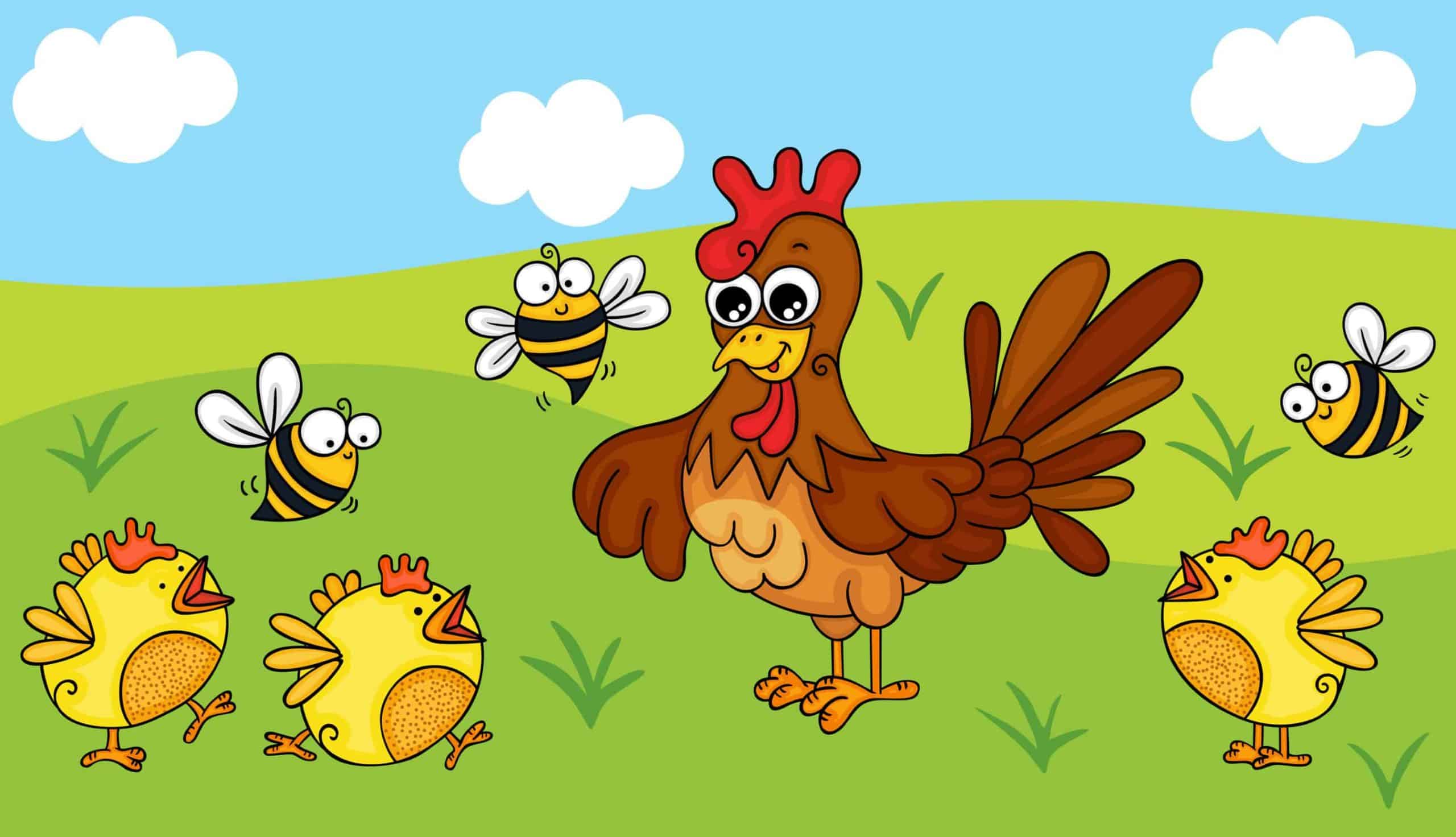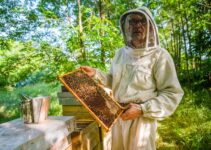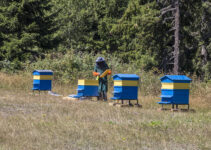For those wanting to improve their sustainable living, I’m sure you’ve thought about keeping both bees and chickens. Both of these magnificent creatures play a crucial role in our lives, and by keeping them ourselves, you can gain much more environmentally-friendly produce. But, before you undergo this sustainable change, do bees harm chickens?
Bee stings can cause devastating effects to chickens, just like humans. However, if you provide each of them adequate space apart from each other, you won’t encounter any issues. You’ll gain some benefits as chickens can help protect bees from small hive beetles and keep their hive much cleaner by eating up the debris of dead bees.
If you want to keep both bees and chickens, I’m sure you’re relieved after consuming the above information. As you can see, chickens can benefit bees by protecting them from small hive beetle, one of their main pests.
However, it would be best if you implemented this correctly. Failing to do so could result in your bees stinging your chickens or even your chickens eating your bees. Therefore, you must become familiar with the below information before introducing bees to some chickens.
Keeping bees with chickens
Keeping bees with chickens can be as complicated or easy as you like it. Typically, the more preparation you undergo, the less likely something is going to go wrong. From knowing this, be sure to consume the below information carefully and develop a solidified plan for keeping bees with chickens.
Wanting to know how to keep bees with chickens? See the following:
Why you should keep bees with chickens
Before we get into some helpful tips you should consider when keeping bees with chickens, let’s first discuss why you should do this. You’ll undoubtedly be surprised that bees and chickens have a symbiotic relationship with one another. Here’s what you need to know:
1.Protection
The first and most prominent reason why you should keep bees with chickens is that chickens will protect the bees. Many insects can harm bees, and chickens adore eating them. Therefore, if you situate chickens next to your beehive (allow for adequate room), then you’ll notice that the chickens will often have a search around the base of the hive.
This is because insects like small hive beetles tend to inhabit these areas to get into the hives easier and eat bees. In some events, this can be catastrophic to a colony and eventually wipe it out completely.
Therefore, it’s a superb idea to keep them together as you may be able to encourage a much stronger colony to grow.
2.Natural food cycle
Including the added protection that chickens offer bees, both attribute to the natural food cycle. Of course, only the bees get consumed, but they also gain some immense benefits from it.
Chickens love to eat pellets, vegetables, fruits, table scraps, and also insects. They consume an abundance of different insects, ranging from spiders to the bees themselves. Wait, the bees themselves? Yes, the bees themselves, but typically chickens will only eat bees when they’re dead (see below benefit).
Needless to say, other insects gravitate towards a hive, such as larvae, hive beetles, wax moths, earwigs, cockroaches, all of which chickens can reduce or even eliminate from being an issue to your beehive by eating them.
So, all in all, your hive can grow much more significantly, and your chickens receive a boost of a natural food source while protecting the bees.
3.Chickens clean up debris
As you can probably now guess, chickens clean up insects and the debris around the hive. When they clean up the bees, the alive bees within the colonies can receive tremendous benefits.
When bees die, they 99% of the time die within their hive. After they die, their bodies typically make their way to the bottom board. If and when this occurs, the other worker bees will slowly but surely start removing the carcasses from their beehive.
However, what if the worker bees never had to undergo this job? Well, that’s practically a job in which chickens can perform. From taking this job away from the worker bees, they can work somewhere else to support the hive. This promotes the colony to grow much more extensively, as they typically don’t waste time removing the carcasses because the chickens will eat them.
After becoming knowledgeable on the above, you can better understand the relationship benefits between bees and chickens. As you can see, although they don’t physically interact with each other, their instincts support one another.
Things to remember when keeping bees with chickens
After becoming familiar with the above, I’m sure you’re eager to start introducing chickens to your bees or vice versa. As mentioned above, if you don’t keep bees and chickens together appropriately, they may fail to produce or live for a long time. Because of this, it’s crucial to ensure that you offer both suitable living conditions. Here are some things you should remember when keeping bees with chickens.
1.Allow for adequate space between the two
The first and most prominent tip we can provide you is to allow for adequate living space between the bees and chickens. Not being able to supply this could be devastating because the bees can sting the chickens, and the chickens can eat the bees if they believe one another is overcrowding their territory.
As a rule of thumb, bees will only sting the chickens if they’re continuously situated outside the hive’s front entrance. This is because of the guard bees becoming overly protective. The closer the chickens get to the hive for long periods of time, the more likely the guard bees will come out and unleash a sting. Again, this could also have a similar effect on the chickens. If they believe the bees are a nuisance, then they’ll feel the need to peck away at their hive and irritate them.
If you’re going to introduce bees to a chicken pen, it may be best to double its size and allow for two different compartments. A good pen that I’ve commonly seen online is a separation between the hive and the chickens. These separate areas don’t need to be blocked off. Just allow a small entrance/exit for the chickens.
2.Have a clear flight path for the bees
Additionally, you’ll want to provide your bees with an ideal and clear flight path. This isn’t important if you’re separating the pen from the hive. But if you include the hive within the pen, you’ll want to be knowledgeable on the below:
Funny enough, bees prefer a longer flight path. Because of this, the best exit and entrance for your bees is usually the roof of the pen. The best examples of this setup I’ve seen typically include a large mesh panel as a roof. This way, the bees can fly upwards and out, which is their preferred flight path.
They like entering and exiting from a high flight path because they try to fly vertically once until they reach their final destination (normally 3 or 4 miles away). Because of this, a pen-like structure is ideal for bees as it promotes a much more ideal flight path.
3.Keep water and chicken feeds away from the bees
The above tips are essential to remember, but you should think about your water and chicken feed location. Not abiding by this tip could result in devastating consequences for both your bees and chickens. Here’s what you need to know:
You’ll want to keep your bees away from your chicken water because they prefer salty water. If they consume and lead a colony to water that doesn’t suit that requirement, it could result in your entire colony of bees being wiped out. Water is essential for both bees and chickens, but always remember that the water each of these creatures consume is much different.
Including water, you also need to keep your bees away from the chicken feed. A usual behavior for chickens is that they’re territorial. Because of this, they can become highly aggressive to you, other chickens, and in this event, your bees. To counteract this issue, try and situate the food well away from the bees.
As you can see, you need to keep the chicken’s water and food source away from the bees. Failing this, could mean the colony can be massively reduced by either poison (from the water) or from being eaten by the chickens.
4.Ensure the chickens don’t disturb the hive
Lastly, you’ll want to keep a close eye on your chickens and almost teach them not to pester the hive. From doing this, you’ll dramatically minimize the adverse effects that could occur from your chickens pecking away at the hive.
However, remember that chickens will loiter around the hive. It doesn’t necessarily mean that they’re disturbing the hive, as they may be eating the dead bees. But, it would help if you always were sure that this is the case. If you’re worried about your chickens potentially agitating your hive, you can always think about putting a small fence up to deter them away.
After reading the above, you should have a general idea of what you need to consider when having bees and chickens situated next to each other. There’s much more to it, but the above tips are must-knows to ensure both creatures are safe and live happily together.
Will bees attack chickens?
Now you’ve become knowledgeable on the above, I’m sure you’re eager to know if bees will attack chickens. Although bees and chickens can have a symbolic relationship, sometimes it isn’t if you don’t inhabit them together correctly.
Chickens are like humans, some are more prone to become seriously injured or sick when stung by a bee. Therefore, one chicken being stung by a bee may be a problem, and another, not. Needless to say, you need to be careful that this doesn’t occur too often. After several bee stings with any chicken, it can enhance the possibilities of both kidney and liver problems.
Typically, if a chicken gets stung by a bee, the factors you need to consider as to whether its bad for the chicken or not include the following:
- Number of stings
- Chicken’s body weight and age
- The health of the chicken’s liver and kidney
- The tolerance the chicken has to a bees sting
- How much venom is injected during the sting
As you can see, there are various factors that you need to think about before deciding if the bee sting is bad for your chicken or not. If your chicken gets stung by a bee and appears to be in discomfort, you should act on the issue. The best way to heal your loved chicken is to carefully check to see if the bee stinger has been removed. After you’ll want to apply 1/2 ml of children’s Benadryl to the affected area. Note, don’t overdose your chicken; only apply 1/2 ml a day until the pain has been eliminated.
Although the above can sound rather scary, should you be scared for your chickens? To be totally honest, no. Bees aren’t alive to sting people. They much rather gathering resources, build strong colonies, and establish themselves as a prominent hive. Because of this, bees aren’t looking to sting your chickens. Instead, they want to protect their hive. So, if this does occur, you should consider dealing with your chicken’s actions first, then your bees.
Final words
After reading the above, I’m sure you’re now knowledgeable about keeping bees with chickens. Something that many people are surprised about is the relationship they have with one another. Both creatures receive immense benefits, the bees gain an added layer of protection against pests, and the chicken obtains a free additional food source.
Keeping bees with chickens is nothing new, and people have noticed the sheer benefits that each creature can provide each other. It’s a much better way of increasing the sustainability of your backyard, farm, or property.
Happy chickens mean more eggs, and happy bees mean more honey. So, what are you waiting for? Start developing your hive and chicken pen collaboration to start receiving a heap load of outstanding benefits.




